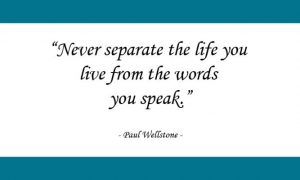《自律養生實踐家之旅341》 身教

高中時代,有過一段往事。由於澎湖屬離島,師資匱乏,當地學生在高中畢業前可以提前報考保送師範大學,錄取後無須參加大學聯考,但畢業後必須返鄉任教。
當時的我既不嚮往成為老師,也對當醫生興趣也不大。我自信能靠自己考上大學,於是就這樣一路碰撞,走到今天。
回首當年的自己,真是一張白紙,對未來沒有任何明確的想法。長輩們給我的唯一方向,是繼承父親的診所。但我心嚮往台北的大都會生活,對家鄉多少懷有不屑,沒有絲毫接班的念頭。
在我眼中,診所只是「店面」,醫生只是被困在裡頭的「店主」,我不想過那樣一成不變的日子。
然而,父親的身教卻在潛移默化中影響了我,我想學他待人和善的一面,卻不願複製他呆板的工作模式。
在高中之前,我很少與父親深談,更多的是因為敬畏與距離。至今仍清楚記得他經常對我說的一句話:「要覺悟。」
成年後,我透過閱讀逐漸理解人的行為,也透過工作體會到父親身上那份難以直說的身段。我甚至在與妻子、孩子的互動中,不自覺複製了父母當年的相處模式,其中包含距離,也包含隔閡。
談到孩子,這是我心底最痛的地方。當我真正領悟教育的本質時,兩個兒子已長大成人,也不再與我同住。
教育沒有訣竅,核心是「陪伴」與「身教」。不是大道理,也不是不斷提醒,我的父親在陪伴上明顯缺席,在身教上也不算出色。
然而,我從小就親眼見過親友與病人對他的尊敬,我能明白:身教不是言語,而是生活中一舉一動的流露。
遺憾的是,當孩子最需要我陪伴時,我不經常在他們身旁。不成熟的父親,往往缺乏身教的力量。
我一向排斥虛假的擁有,例如頭銜與權威。在軍方醫院服役時,感受到文化的虛浮;進入職場後,更親見人際互動中充斥的銅臭與假面。
頭銜本該是尊稱,而非空殼。我從未渴望成為教員,卻早已習慣被稱為老師,既然得到了這個稱呼,就必須不負其名。
我不喜歡醫療文化,因為其中的身教顯得虛假。醫病之間的關係,除非進入身體的真相,否則難以看透。
於是,我不得不尋找一個能堅守價值的所在,還給環境真相,也為願意相信的人,留下真誠的身教。
教育最美的地方,在於師生彼此的滋養。學生從老師獲得成長,老師也因學生而不斷砥礪,這是一種相互成全的身教。
如同母親陪伴孩子玩樂,孩子的純真同樣成為母親的養分。身教,從來不是單向的給予,而是雙向的養成。
我很欽佩那些能教出有教養孩子的父母,他們不需說教,教養自會在舉止間流露。優良的身教會代代相傳,最終惠及社會。
真正的教育,不在於給予好處,也不在於依靠懲罰或提醒。教育的本質,是幫助一個人找到屬於自己的存在價值,幸運的是,這正是我所從事的工作。
我常覺得,連學生都未必清楚我在做什麼,即便他們與我很親近。我的工作就是身教,而教材本身,也包含著學生。學生的成長,往往反過來成為我最好的砥礪。
人生最終的目的,是「回家」。身體是家,自己也是家。我很幸運,能引導許多人踏上這條回家的路。
找到身體,就有機會找到自己;找到自己,也更能回到身體。
我們要學會珍惜和疼惜身體,也要學會尊敬和尊重自己。事實上,身體與自我,一直都在為我們示範身教,只是我們沒意識到,只是我們長期被環境汙染,不和身體在一起,也不知道自己是誰。
(永遠不要讓你活出的生命與你說出的言語分離)
Embodied Teaching
During high school, I experienced a particular episode that left a mark. Because Penghu is an outlying island with a shortage of teachers, local students were allowed to apply early for guaranteed admission to teachers’ universities. Once admitted, they could skip the college entrance exams, but after graduation they were required to return home to teach.
At the time, I neither aspired to become a teacher nor felt much interest in becoming a doctor. I was confident I could enter university on my own, so I simply stumbled forward along my own path, all the way to where I am today.
Looking back, I was like a blank sheet of paper, without any clear vision for the future. The only direction given by my elders was to inherit my father’s clinic. Yet my heart was set on the metropolitan life of Taipei. Toward my hometown, I harbored a certain disdain, with no intention of ever taking over the family practice.
To me, the clinic was just a “shopfront,” and the doctor merely the “shopkeeper” trapped inside. I did not want such a monotonous life.
And yet, my father’s embodied teaching subtly influenced me. I wanted to learn his kindness toward others, but I resisted replicating his rigid work routine.
Before high school, I seldom had deep conversations with him. More often, there was a mixture of reverence and distance. I still clearly recall the words he often said to me: “Be awakened.”
As an adult, through reading I gradually came to understand human behavior, and through work I came to appreciate the unspoken humility my father carried. I even found myself unconsciously repeating with my wife and children the patterns I once observed between my parents—patterns that carried both distance and estrangement.
When it comes to my children, this is my deepest wound. By the time I truly grasped the essence of education, both of my sons had already grown up and no longer lived with me.
There are no tricks to education. At its core, it is companionship and embodied teaching. It is neither lofty lectures nor constant reminders. My father was largely absent in companionship, and not particularly outstanding in embodied teaching either.
Still, since childhood I had seen the respect he received from friends and patients. From this I understood: embodied teaching is not in words, but in the quiet expression of one’s everyday conduct.
Regrettably, when my children needed me most, I was often absent. An immature father often lacks the power of embodied teaching.
I have always rejected false possessions—titles and authority, for instance. During my service in a military hospital, I witnessed the hollowness of such a culture. Later, in the workplace, I saw firsthand how human interactions were filled with the stench of money and pretense.
Titles should be honors, not empty shells. I never desired to be an academic teacher, yet I grew accustomed to being called one. And since I was given that name, I must live up to it.
I never liked the medical culture, because its embodied teaching often felt false. The doctor-patient relationship, unless it truly touched the truth of the body, was hard to see clearly.
Thus, I had no choice but to seek a place where I could uphold my values, restore truth to the environment, and leave behind genuine embodied teaching for those willing to believe.
The beauty of education lies in the mutual nourishment between teacher and student. Students grow from teachers, while teachers are refined through their students. This reciprocal shaping is itself a form of embodied teaching.
Just as a mother playing with her child is nourished by the child’s innocence, embodied teaching has never been one-directional—it is always mutual cultivation.
I deeply admire parents who can raise well-mannered children without a word of preaching, for upbringing flows naturally through their demeanor. Such embodied teaching is passed down across generations, ultimately benefiting society.
True education does not lie in offering benefits, nor in relying on punishment or reminders. The essence of education is to help a person discover their own sense of value. Fortunately, this is precisely the work I have devoted myself to.
Often, I feel that even my students may not fully understand what I do, even those who are close to me. My work itself is embodied teaching—and the students themselves are part of the teaching material. Their growth, in turn, becomes my greatest refinement.
The ultimate purpose of life is to “return home.” The body is home, and the self is also home. I am fortunate to have guided many people onto this path of return.
To find the body is to have the chance to find oneself; to find oneself is to return more fully to the body.
We must learn to cherish and care for our bodies, and also to honor and respect ourselves. In fact, both body and self have always been demonstrating embodied teaching to us—we simply fail to notice. For too long, we have been polluted by our environment, separated from our bodies, and estranged from who we truly are.


